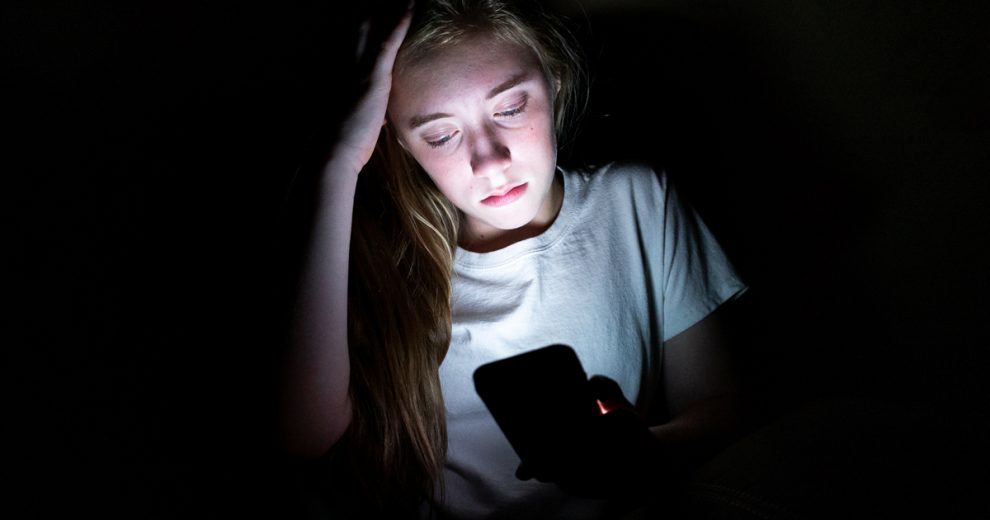“why social media is bad for teens”? Social media is a big part of most teens’ lives. A 2018 Pew Research Centre survey of nearly 750 13- to 17-year-olds found that 45% are online almost constantly and 97% use a social media platform such as YouTube, Facebook, Instagram, or Snapchat.
Teenagers are among the biggest users of social media—but is it consuming them? In recent years, scientists have discovered troubling links between social networking and mental health challenges, from depression to major depression.
Table of Contents
The Stats on Teen Social Media Addiction
According to the Common Sense Media report released in 2022, the latest teen social media statistics indicate that social media usage among teenagers is on the rise. But they are getting less from it. Addiction plays a role in their scrolling behaviors. Here are some of the latest statistics from the new report:
- 84 percent of teens use social media, and 62 percent use it daily.
- On average, teenagers spend 1 hour 27 minutes scrolling through social media per day, an increase of 17 minutes since 2019.
- Only one-third of teens say they enjoy social media “a lot,” down from 40 percent in 2019.
- 42 percent of teenage girls say they enjoy social media, compared to 27 percent of teenage boys.
- Girls are more likely than boys to use social media daily (68 percent vs. 57 percent).
- Instagram, TikTok, and Snapchat are the most popular social media sites for teenagers.
- Between 2019 and 2021, social media usage increased by 7 percentage points, from 31 to 38 percent.
Social media benefits
Virtual entertainment permits teenagers to make online personalities, speak with others, and create communities. These organizations can furnish teenagers with significant help, particularly assisting those who are struggling with avoidance or have persistent illnesses.
Teenagers likewise utilize web-based entertainment for diversion and self-expression. Furthermore, the stages can open teenagers to recent developments, permit them to interact across geographic obstructions, and show them various subjects, including solid ways of behaving. Web-based entertainment that is funny or diverting or gives a significant association with peers and a wide informal community could help teenagers stay away from depression.
Social media harms
Be that as it may, social media use can likewise adversely influence teenagers, diverting them, disturbing their rest, and presenting them with harassing, gossip spreading, unreasonable perspectives on others’ lives, and companion pressure.
The dangers may be connected with how much virtual entertainment teenagers use. A 2019 investigation of in excess of 6,500 12-to-15-year-olds in the U.S. found that the individuals who spent over three hours daily utilizing social media may be at elevated risk for emotional wellness issues. One more 2019 investigation of in excess of 12,000 13-to-16-year-olds in England found that utilizing virtual entertainment multiple times each day was associated with poor psychological wellness and prosperity in youngsters.
Different investigations additionally have noticed links between elevated degrees of web-based entertainment use and depression or anxiety effects. A 2016 investigation of more than 450 youngsters found that more prominent virtual entertainment use, evening web-based entertainment use, and close-to-home interest in online entertainment — like inclination upset when kept from signing on — were each connected with more regrettable rest quality and more elevated levels of nervousness and sadness.
How adolescents utilize virtual entertainment could likewise determine its effect. A recent report found that social examination and criticism sought by teenagers utilizing web-based media and cell phones were connected with burdensome side effects. What’s more, a 2013 investigation discovered that more seasoned teenagers who utilized online entertainment latently, for example, simply by reviewing others’ photographs, revealed decreases in life satisfaction. The individuals who utilized online entertainment to interface with others or post their own content didn’t encounter these downfalls.
Furthermore, a more seasoned concentration on the effect of web-based entertainment on undergraduate students showed that the more they utilized Facebook, the more grounded their conviction that others were more joyful than they were. Yet, the more time the students spent going out with their companions, the less they felt like such.
Protecting your teen
There are steps you can take to encourage responsible use of social media and limit its negative effects. Consider these tips:
- Set reasonable limits.
Talk to your teen about how to prevent social media from interfering with his or her activities, sleep, meals, or homework. Encourage a bedtime routine that avoids electronic media use, and keep cellphones and tablets out of teens’ bedrooms. Set an example by following these rules yourself.
- Monitor your teen’s accounts.
Let your teen know that you check his or her social media accounts regularly. You can aim to do this once a week or more. Make sure you follow along.
- Explain what’s not OK.
Discourage your teen from gossiping, spreading rumours, making threats, or damaging someone’s reputation online or otherwise. Talk to your teen about what’s appropriate and safe to share on social media.
- Encourage face-to-face contact with friends.
This is especially important for teenagers who are prone to social anxiety disorder.
- Talk about social media.
Talk about your own social media habits. Ask your teen how he or she uses social media and how it makes him or her feel. Remind your teen that social media is full of unrealistic images.
The Bottom Lines
If you think your teen is experiencing signs or symptoms of anxiety or depression related to social media use, talk to your child’s health care provider.




Add Comment